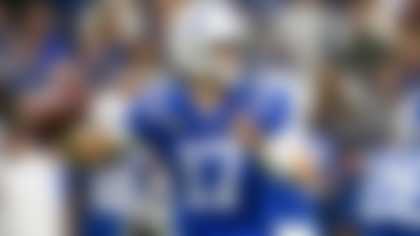The report released by Ted Wells on Wednesday did not produce a smoking gun explaining how the New England Patriots' footballs came to be underinflated during the AFC Championship Game. It might have given us something more disconcerting, though: a creeping sense of disappointment, that the Patriots, as successful a franchise as exists in professional sports, might have again crossed the very fine line that separates gaining a competitive edge from cheating -- and, most disturbingly, that this time, one of the game's towering players, Tom Brady, was culpable and perhaps even lied.
To be clear, there is just enough vagueness in Wells' extensive report to give the NFL plenty of wiggle room and a lot to think about when pondering punishment in the coming days, with television executives and 31 other team owners peering over the shoulders of Troy Vincent and Commissioner Roger Goodell. There are a lot of "unlikelys" and "we believes" and "more probable than nots." But then, "more probable than not" is the NFL's threshold for finding violations of rules.
Along with a heap of circumstantial evidence, there are also a few damning sentences that, for the first time in his extraordinary career, cast Brady as something less than the ideal figure we've all wanted to believe he is: the work-hard, do-right practitioner who has succeeded beyond even the wildest expectations because of a fearsome drive and sparkling intelligence. Thanks to words like "claims not plausible" and "contradicted by other evidence" and "declined to make available," Brady's honesty and legacy as a standard-bearer of greatness in football history are now up for reconsideration, thrown into the same pile as those of Bill Belichick; both are brilliant football men who many suspect also have flawed levels of fealty to the rules of fair play.
To know how deeply this could cut, just read the blistering statement Brady's agent, Don Yee, released Thursday morning. It suggests, among other things, that the NFL essentially ran a sting operation to snag the Patriots and Brady after it was alerted by Indianapolis Colts general manager Ryan Grigson about concerns regarding the footballs. It also suggests that, because the law firm for which Wells works does other legal work for the league, the investigation could not be considered independent. How the NFL could bring in someone not directly employed by the league to conduct an investigation -- assuming that person would not provide services pro bono -- is not addressed by Yee.
"It is a sad day for the league as it has abdicated the resolution of football-specific issues to people who don't understand the context or culture of the sport," Yee wrote. "I was physically present for my client's interview. I have verbatim notes of the interview. Tom made himself available for nearly an entire day and patiently answered every question. It was clear to me the investigators had limited understanding of professional football. For reasons unknown, the Wells report omitted nearly all of Tom's testimony, most of which was critical because it would have provided this report with the context that it lacks."
Nobody who has watched the NFL in the last 15 years thinks Belichick or Brady needed any untoward help to win all those championships. It will be a part of Brady's lore that he played even better in the AFC title game after the league reinflated the footballs at halftime.
But make no mistake, there are people around the league who are wondering just how much of an advantage Brady gained by being able to better grip the football in cold or damp weather. The failure to give him the benefit of the doubt is the residue of Spygate, a scandal that, it seemed, had finally been minimized by New England's fourth Lombardi Trophy, because it was the first won by the Patriots since the league caught and presumably shut down the team's resident Martin Scorseses. Instead, Spygate now resurfaces, because the NFL faces the question of whether to consider, for the purposes of discipline, the Patriots to be repeat offenders. That question looms, and it is unclear how the NFL will lean.
The footballs weren't the difference in the blowout victory over the Colts, but how about in the previous week's nailbiter against the Baltimore Ravens? They might not have mattered there, either; in fact, we don't know for sure whether they were tampered with in that game. But doubt will linger, just as it did for years after Spygate, and that is bad enough.
This is the bottom line on these matters: No person engaged in athletic competition purposefully skirts the rules -- whether with a pressure gauge or PEDs -- unless that person thinks there is an edge to be gained. The outcome -- whether softer footballs helped Brady thread a pass to Rob Gronkowski with greater zip, or whether a juiced slugger could turn on a fastball quicker -- does not matter. The intent does.
Of course, all quarterbacks communicate with equipment men about how they want footballs prepared, and it stretches credulity to think Brady is the only quarterback in the league to have ever conveyed a desire for the football to be prepared in a way the NFL does not approve of. It is also laughably naïve to think two low-level employees would go off the reservation and make alterations by themselves before the biggest game of the season, without at least having tacit input from -- and the approval of -- the starting quarterback.
Most baffling is why Brady would feel the need to allow the rules to be broken to the degree the report suggests. The Wells Report reads like a two-bit caper, with missing footballs, a frantic referee, a guy who calls himself "the Deflator" and a bathroom without a urinal -- except that it ensnares one of the NFL's biggest stars.
Let the armchair psychoanalysts have a field day trying to divine Brady's motivation. That, frankly, is irrelevant right now. The evidence that points to Brady knowing what was going on with the footballs -- and then perhaps participating in a potential attempted cover-up after the story broke -- presents the NFL and its fans with a tricky conundrum. Cleveland Browns GM Ray Farmer was recently suspended four games for texting to the sidelines his opinion on play calls. How, then, should the most important player on the field be penalized for likely being involved, to some degree, in the game's central object being tampered with?
Harsh discipline would send a resounding message that the NFL won't tolerate rule-bending, even by its marquee player, who happens to play for one of the league's most powerful owners. But Goodell and his deputies also know that a suspension would permanently tarnish Brady and the Patriots, to say nothing of removing him from the nationally televised kickoff game in September -- a celebration of a Super Bowl that would very quickly turn into an awkward post-mortem.
Yee, in his statement, said it is common knowledge in the legal community that reports such as the one Wells produced "generally are written for the benefit of the purchaser."
But there is no benefit to the league. Brady is the NFL's poster boy, and the Patriots are widely acknowledged as a well-run franchise. The findings do nothing but greatly increase the chances that both will be tainted, and that the 2015 season will be dotted by reminders of an event that everybody -- from Robert Kraft, Brady and Goodell to those two glorified ballboys -- would rather forget.
Only one thing is certain. There will be no apology from the league, as Kraft had once hoped would be necessary. But no matter what happens next, there is already plenty to regret.
Follow Judy Battista on Twitter @judybattista.












